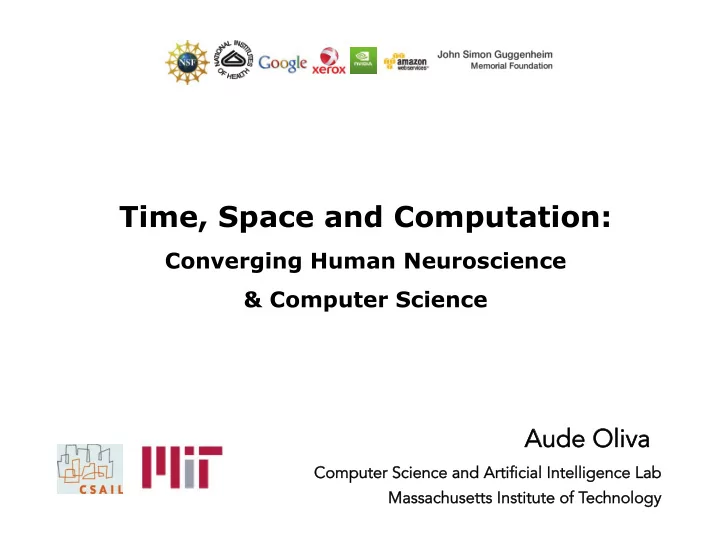

Time, Space and Computation: Converging Human Neuroscience & Computer Science Aude Oliva Computer Science and Artificial Intelligence Lab Massachusetts Institute of Technology
COMPUTATION Trevor Jitendra Darrell Malik Aude Antonio Pietro Andrew Oliva Torralba Perona Zisserman
SPACE Russell Moshe Epstein Bar Nancy Kanwisher Talia Konkle Kalanit James Grill- Haxby Spector
TIME Radoslaw Dimitrios Aude Nikolaus Cichy Pantazis Oliva Kriegeskorte
Computation with millions of instances
Deep architectures Geoffrey Hinton, Yann LeCun Object-centric network Scene-centric network PLACES
Object-centric deep architectures VGGNet: Very deep ConvNet R-CNN: Regions with CNN features Girshick, Donahue, Darrell & Malik (CVPR 2014) Simonyan & Zisserman (2014) Very deep ConvNets Very deep ConvNet Simonyan & Zisserman (2014) (graph by D. Hoeim)
Places Model places.csail.mit.edu Torralba Lapedriza Zhou Xiao NIPS 2014 release: 2.5 million images, 205 scene categories Zhou, Lapedriza, Xiao, Torralba & Oliva (2014), NIPS
Deep architectures A Visualization of the learned representation for each unit Object-centric CNN C1 filters C2 feature maps C5 feature maps C7 feature maps Object like shapes Scene-centric CNN C1 filters C2 feature maps C5 feature maps C7 feature maps Space like shapes Zhou, Lapedriza, Xiao, Torralba & Oliva (2014), NIPS
Layer 5: Artificial Receptive fields Scene-centric units Object-centric units Zhou, Lapedriza, Xiao, Torralba & Oliva (2014), NIPS
Non invasive neuro-imaging techniques MEG fMRI Radoslaw Dimitrios (msec-resolution) (mm-resolution) Cichy Pantazis Magneto encephalography Functional Magnetic Resonance Imaging ? Sensors (time) Voxels (space)
Representational Geometry Nikolaus Kriegeskorte (2008) Sensor 2 Voxel 2 Relative distances Sensor 1 Voxel 1 Shepard et al., 1980; Kruskal and Wish., 1978; Edelman et al. 1998; Kriegeskorte et al., 2008; Mur et al., 2009; Liu et al., 2013
Representational Geometry Nikolaus Kriegeskorte (2008) Round shape Body part “RDMs as a hub to relate different representations across sensors and models”
Time-specific fMRI searchlight analysis A spatially unbiased view of the relations in similarity structure between MEG and fMRI 306 x 1 vector MEG, vs. 170ms t Spearman Correlation Voxels within searchlight fMRI vs. voxel voxel Cichy, Pantazis, Oliva (in preparation)
The dynamics of object recognition
Object recognition in context
Spatiotemporal maps of correlations between MEG and fMRI 100 msec Visual areas Inferior-temporal cortex 100 msec Visual areas Parahippocampal cortex
Algorithmic-specific fMRI searchlight analysis A spatially unbiased view of the relations in similarity structure between deep architectures and fMRI Voxels within searchlight fMRI vs. voxel voxel Spearman Correlation Layer 3 vs. Cichy, Khosla, Pantazis, Torralba, Oliva (in preparation) See also Kaligh-Razavi & Krigeskorte (2014)
Spatiotemporal map of correlations between fMRI and model layers
Can we predict which images are memorable ?
Predicting Visual Memorability ~ 60,000 photographs with Memorability scores Aditya Khosla
Predicting Visual Memorability ~ 60,000 photographs with Memorability scores Most memorable Less memorable 0(1&2$*$+$,-.3$ !""#$%"&'()"$*$+$,-./$
Cognitive-level Algorithms Memorability: metric of the utility of information Understand human Diagnose memory Design mnemonic memory problems aids Data Mobile Retrieve Visualization applications better images from search Logos Computer Social Graphics Slogans Networking - cognitive - words- saliency Summarize Education Face Bigdata – - ! Individual Memorability images, videos difference
Time, Space and Computation A converging framework for hypothesis testing Power of Prediction Comparing large-scale processing between natural and artificial systems will not only allow us to understand why biological systems have implemented a certain mechanism, but will allow - Studying the strategies that work best for performing specific tasks - ! Characterizing the operations when the system is broken - ! Exploring the alternatives biological systems have not taken A.I “Alien” Intelligence (Kevin Kelly, Wired magazine) CISE, RI: 1016862 R01-EY020484
Recommend
More recommend